Part 3: Organisational health and capability
To ensure that we can achieve our outcomes, impacts, and outputs, we need a strong foundation of skilled people working together in a well-run organisation.
Our core expertise is in auditing, and public governance and management. Underlying this expertise are our technical skills (for example, in accounting and auditing) and the exercise of our professional judgement. We are able to apply this by:
- listening to, and knowing about, the public entities we audit, our stakeholders, and the public sector so that we understand their expectations and the context for our work, and know the effect of our work; and
- building our individual and collective expertise, experience, and judgement so that we can strengthen our contribution to improving public sector performance.
Our people
After a period of employment stability during the global recession, we are experiencing higher turnover of staff and the return to an environment where our people and their skills are in high demand among domestic and overseas organisations. We will continue to work on our staff-retention activities and also continue to recruit experienced staff from within New Zealand and overseas.
We use a number of indicators to measure the engagement, capability, and effectiveness of our people. Many of these indicators come from surveys of public entities we have audited and surveys of our staff. We aim to improve or at least maintain these results during the next three years. We summarise our measures and standards for organisational health and capability in Figure 34, and show details with our previous performance in the pages following Figure 34.

Figure 34
Summary of measures and standards for organisational health and capability
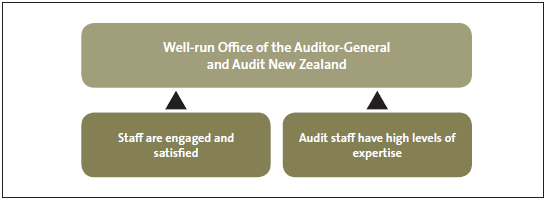
Measures and standards, and previous performance, for organisational health and capability
Staff are engaged and satisfied
- Improve (or at least maintain) the engagement and satisfaction of our staff measured against the previous two years.
Figure 35
Gallup Survey's staff engagement scores
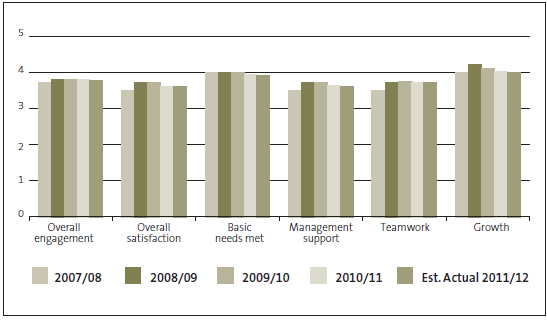
- Improve (or at least maintain) the average years of experience of our staff measured against the previous two years.
Figure 36
Average number of years staff have been employed by the Office
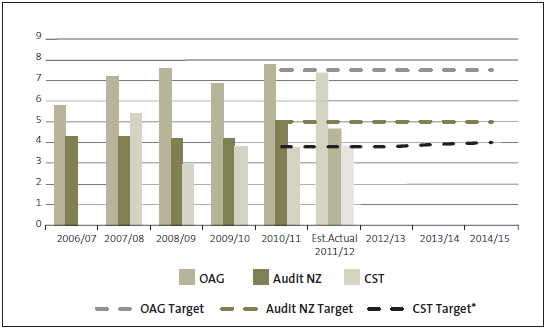
* Corporate Services function is shared between the OAG and Audit New Zealand business units. From 2008, the statistics for Corporate Services staff are shown separately. In previous years, these staff were distributed between the two business units.
Audit staff have high levels of expertise
- Achieve a pass rate of staff undertaking accreditation examinations of not less than 95%.
Figure 37
Percentage of audit staff passing NZICA accreditation examinations
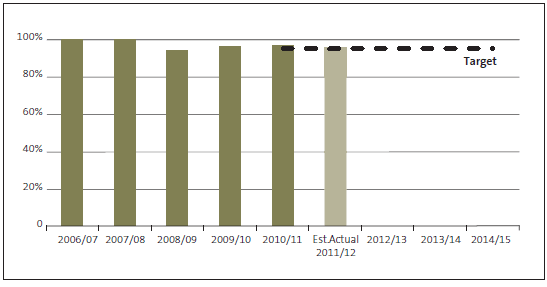
- Quality assurance review for all appointed auditors are completed during a three-year period. Of the auditors reviewed in any given year, 100% achieve a grade of satisfactory or better.
Figure 38
Percentage of auditors achieving a grade of satisfactory or better from quality assurance review
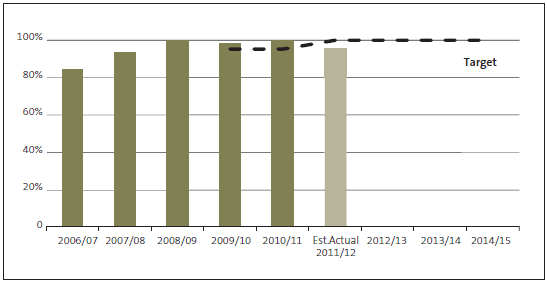
- Client survey feedback shows that auditors' knowledge of entities' business and operating context is improving, and that auditors are investing in work to understand that context. Our clients give us improved (or at least maintained) ratings (on a scale of 0 to 10) compared with the previous two years for their auditors':
- understanding of the client's business and the risks that clients face;
- general skills and knowledge required to conduct their audit; and
- provision of information to help clients identify and promote improvement in their operations.
Figure 39
Ratings for expertise of Audit New Zealand staff
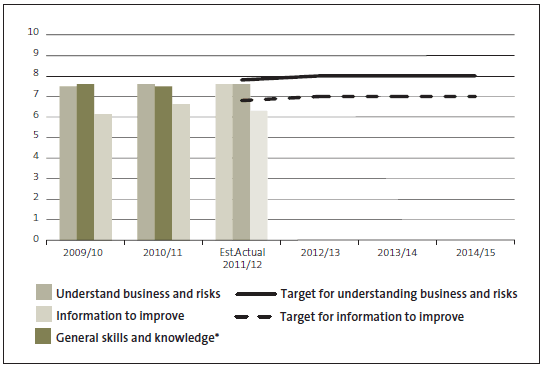
* No specific target set for general skills and knowledge.
Audit staff have high levels of expertise: Auditing performance information
- Our quality assurance reviews of our audit and assurance work confirms that auditors are carrying out the requirements of AG-4 (revised).
Results: Our quality assurance reviews of our audit and assurance work confirms that auditors are carrying out their requirements for performance information in keeping with the Auditor-General's auditing standards and our attestation that performance statements fairly reflect the achievements of the entity.
During 2010/11, a quality assurance review was carried out of a selection of local authority audits (the first sector where AG-4 (revised) applies). The review found that auditors understood the new requirements and were suitably trained to audit performance information in keeping with AG-4 (revised).
Equal employment opportunities
The Office's programme for addressing equal employment opportunities is through its recruitment and employment policies. The principles of equal opportunity are embedded in the Office's policies and procedures. In particular, our recruitment programme aims to attract and appoint the best people, who have the appropriate skills, values, and attributes to meet the Office's needs, objectives, and strategic direction. We recruit in a manner that provides equal employment opportunity to Māori, women, ethnic or minority groups, and people with disabilities.
Recruitment and employment decisions and practices (such as feedback from exit interviews) are monitored to confirm that policies are applied. Managers are made aware of, and given support to fulfil, our good employer obligations through specific programmes and courses and one-on-one coaching.
Our staff profile shows a good level of diversity, which we expect to maintain during the next three years.
Business practices
We have an extensive quality assurance programme for all our outputs and services. This programme indicates an acceptable level of quality. Nevertheless, we continue to work on improving this.
Our internal audit function uses the services of an external expert to advise our management team on the internal audit programme. The expert agrees the internal programme with our independent Audit and Risk Committee, supervises the internal audit activities, and presents the findings to the Committee.
Office accommodation
In 2011/12, we continued to make progress on addressing our long-term property needs in Wellington and Auckland, but we have been less successful in Christchurch.
The Officers of Parliament Committee agreed to our business case for capital funding in Budget 2011 for the fit out of refurbished premises for all our Wellington staff. This will allow us to achieve our long-term objective of having our OAG and Audit New Zealand Wellington staff in the same building. We expect this project to be completed in 2013.
The lease on our Auckland premises will expire in 2012. We are currently considering options for our Auckland staff and expect to complete new arrangements this year.
The Canterbury earthquakes have caused considerable disruption to Audit New Zealand operations in Christchurch, where our staff have been working from temporary premises since February 2011. Although these premises meet our basic requirements, the effectiveness and efficiency of our people have been affected. We have been actively seeking suitable long-term premises in the Christchurch area throughout 2011/12, but have not been successful. We will continue this search in 2012/13.
New information management system
The Auditor-General is in a unique position in the New Zealand public sector. Auditors, on the Auditor-General's behalf, carry out audits every year on every single public sector entity throughout the country.
We also carry out performance audits, inquiries, and research work, and we frequently visit and correspond with public entities. In doing so, we not only collect significant financial and performance information about those entities but also build up significant insight into the public sector and how well public entities are operating.
This means that the Auditor-General has a range of information available that does not exist in a single place anywhere else. The Auditor-General recognises the significant value that this information and insight could bring to improving the performance of the public sector. Therefore, she is keen to make the collection, analysis, and use of this information and insight as effective and efficient as practicable. To this end, the Auditor-General is considering how we can best collect, store, analyse, share, reuse, and report on the information we hold.
With this objective in mind, we have issued a Request for Proposal seeking a solution that will allow our staff to effectively and efficiently make full use of the rich collection of information we already have and to be able to contribute new information quickly and easily. We recognise that this may take some years to achieve.
We expect that implementing a suitable information management system will be a focus for us in 2012/13. However, we also rely on information technology to complete all our work. To ensure an effective, efficient, and customer-focused service, our audit staff working in the field use specialist auditing and remote access and communications tools. In the OAG, the audit status database system is used to manage the allocation, tracking, and reporting of audits. We continue to maintain and enhance these systems.
page top